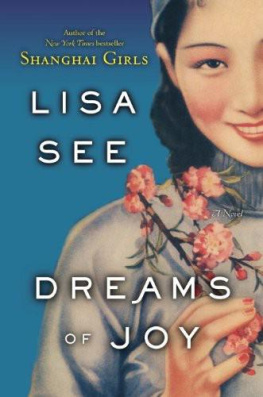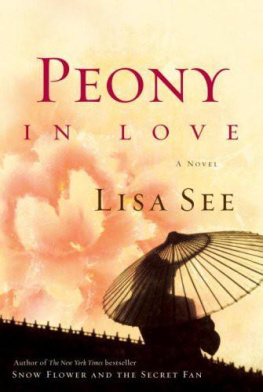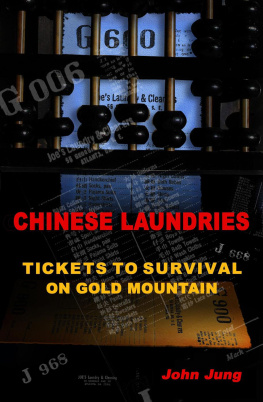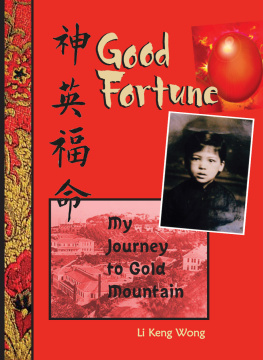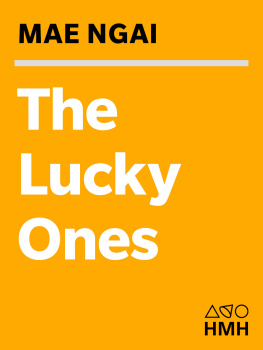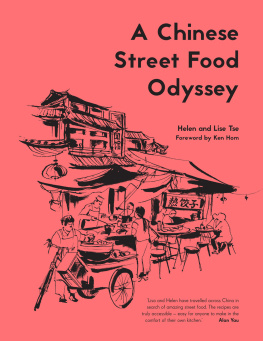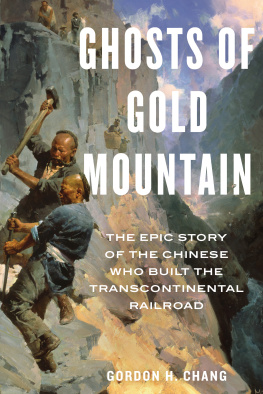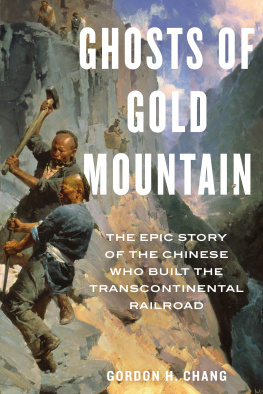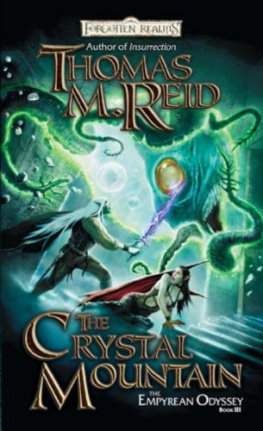Lisa See - On Gold Mountain: The One-Hundred-Year Odyssey of My Chinese-American Family
Here you can read online Lisa See - On Gold Mountain: The One-Hundred-Year Odyssey of My Chinese-American Family full text of the book (entire story) in english for free. Download pdf and epub, get meaning, cover and reviews about this ebook. year: 1996, publisher: Vintage, genre: Detective and thriller. Description of the work, (preface) as well as reviews are available. Best literature library LitArk.com created for fans of good reading and offers a wide selection of genres:
Romance novel
Science fiction
Adventure
Detective
Science
History
Home and family
Prose
Art
Politics
Computer
Non-fiction
Religion
Business
Children
Humor
Choose a favorite category and find really read worthwhile books. Enjoy immersion in the world of imagination, feel the emotions of the characters or learn something new for yourself, make an fascinating discovery.

- Book:On Gold Mountain: The One-Hundred-Year Odyssey of My Chinese-American Family
- Author:
- Publisher:Vintage
- Genre:
- Year:1996
- Rating:3 / 5
- Favourites:Add to favourites
- Your mark:
- 60
- 1
- 2
- 3
- 4
- 5
On Gold Mountain: The One-Hundred-Year Odyssey of My Chinese-American Family: summary, description and annotation
We offer to read an annotation, description, summary or preface (depends on what the author of the book "On Gold Mountain: The One-Hundred-Year Odyssey of My Chinese-American Family" wrote himself). If you haven't found the necessary information about the book — write in the comments, we will try to find it.
On Gold Mountain: The One-Hundred-Year Odyssey of My Chinese-American Family — read online for free the complete book (whole text) full work
Below is the text of the book, divided by pages. System saving the place of the last page read, allows you to conveniently read the book "On Gold Mountain: The One-Hundred-Year Odyssey of My Chinese-American Family" online for free, without having to search again every time where you left off. Put a bookmark, and you can go to the page where you finished reading at any time.
Font size:
Interval:
Bookmark:
On Gold Mountain
Lisa See
On Gold Mountain
Copyright 1995 by Lisa See
Cover art to the electronic edition copyright 2009 by RosettaBooks, LLC
All rights reserved under International and Pan-American Copyright Conventions. Published in the United States by Vintage Books, a division of Random House, Inc., New York and simultaneously in Canada by Random House of Canada Limited, Toronto. Originally published in hardcover by St, Martins Press, New York, in 1995.
First electronic edition published 2009 by RosettaBooks LLC, New York.
ISBN Kindle edition: 9780795304927
ISBN Mobipocket edition: 9780795304934
For the great-great-grandsons of
Letticie and Fong See,
Alexander See Kendall
and
Christopher Copeland Kendall
Fooling around in the papers my grandparents, especially my grandmother, left behind, I get glimpses of lives close to mine, related to mine in ways I recognize but dont completely comprehend. Id like to live in their clothes a while.
Wallace Stegner, Angle of Repose
F ONG See, my great-grandfather, left China in 1871 as a youngster, found prosperity on the Gold Mountain (the Chinese name for the United States), and lived to reach his hundredth birthday. Rising out of a mass of nameless Asian immigrants, he became one of the richest and most prominent Chinese in the country. He lured customers into his Asian art store by selling tickets to see a stuffed mermaid. He loved money, and had a childlike enthusiasm for fancy cars. He also had a way with women. My family always knew that Fong See had two wives. The marriage between Fong See and Letticie Pruettmy Caucasian great-grandmotherwould go on to establish the See name. The second wife, a Chinese waif who had supported herself making firecrackers, was only sixteen when she married my great-grandfather, who was sixty-four at the time. This family always lived under the name of Fong. Altogether, Fong See sired twelve childrenfive Eurasian, seven Chinesethe last born when he was in his late eighties. This is the story of the Sees and the Fongs and how they assimilated into America.
As a girl, I spent frequent weekends and most of my summer vacations with my paternal grandparents in Chinatown. We would pass through a moon gate guarded by two huge stone lions and enter the dark, cool recesses of our familys Chinese antique store, the F. Suie One Company, a gigantic mercantile museum that contained, among other things, porcelains taken from the royal kiln and floated downriver on sampans; altars pillaged from provincial temples; and huge architectural carvings shipped in sections to be reconstructed by Fong Sees sons in one of his many warehouses.
At lunchtime, Grandma Stella and I would walk up the street to a restaurant that must have had a real name but that we just called the little place. Along the way wed stop to chat with Blackie at the Sam Sing Butcher Shop, with its gold-leafed roast pig in the window. Wed stop in at Margarets International Grocery and browse through the aisles with their salted plums, dried squid, and fermented tofu. At the restaurant, wed go back to the kitchen to chat with the cook and watch as he packed up our order into cartons.
Once back at the store, Id go upstairs to the workroom, with its huge machinery and its pinups of sedate Chinese maidens, where my grandfather and great-uncle Bennie would be engulfed by dense clouds of sawdust and the din of saws. Bennie would invariably look at me wild-eyed and shout, Im gonna put you in trash can. Terrified, Id scramble back downstairs and my grandfather and uncle would wash up with Lava soap.
After lunch, if I got boredperhaps after playing in the mountains of straw packing, or climbing into the arms of a gigantic Buddha, or making a fort underneath one of the large altarsGrandma Stella would let me help her while she worked on the restoration of a coromandel screen. I might clean brushes or mix ink; sometimes she let me use my fingertips to press clay into the chipped areas. Or I might help my great-aunt Sissee as she dusted and polished her way from the bronze room to the art room to the room for scrolls and fabrics, and from one end of the main hallwhich held exquisitely carved furnitureto the other.
In the late afternoons, my grandmother and great-aunt Sissee would relax in wicker chairs in the back of the store over cups of strong tea. During that quiet and comfortable time they would reminisce about the past. They told intriguing and often silly stories about missionaries, prostitutes, tong wars, the all-girl drum corps, and the all-Chinese baseball team. They spoke about how the family had triumphed over racist laws and discrimination. Then, as inevitably as Uncle Bennies threat of the trash can, would come my grandmothers assertion that, Yes, during the war, the lo fan (white people) made all of us Chinese wear buttons so that they would know we werent Japanese.
My grandmother taught me how to wash the rice until the water ran clear, thenwithout the aid of a measuring cuppour water over the grains in the steamer up to the first knuckle of a hand. It didnt matter if it was her knuckle or mine, she explained; for five thousand years the system had worked perfectly. Finally she would place a few lengths of lop cheung, a delicious pork sausage, on top to cook as the rice steamed. Meanwhile, my grandfather would be chopping ingredients. Once the rice was on, I became my grandfathers second cook. The best I ever had, he used to say. Togetheralthough all these years later I cant remember a single thing I didwe would make up a dish of tomato beef for which he was remembered decades after his death.
At family weddings, wed wait at our table for the bride to come by, and my grandmother would let me be the one in our group to hand over the lai seegood-luck money wrapped in a red envelope with gold characters of felicity and fortune limned on the outside. My grandmother would take me from table to table through huge banquet rooms, explaining who each and every person was and how they were related to me. This is your first cousin once removed. This is your third cousin.
In 1989, Aunt Sissee celebrated her eightieth birthday with a traditional Chinese banquet. I will always remember how my cousins and I left our banquet room to spy on the wedding taking place in the main dining room, where at least five hundred guests kept tapping their chopsticks on their bowls or glasses, making an amazing racket. Well, they must be from Taiwan, one of the cousins sneered. You know, FOBs, fresh off the boat. Since Fong Sees first voyage and his early dubious career selling crotchless underwear to brothels, the family had become the old line, the aristocracy. No longer FOBs, we were ABCsAmerican-born Chinese.
That evening I gave Sissee a copy of Ruthanne Lum McCunns book, Chinese American Portraits, which, for all its tragedies, secrets, and illicit exploits, also conveys a powerful cultural and artistic ethos. Three days later my cousin Leslee called. She wanted me to know that Sissee, her mother as well as my great-aunt and the only living child of my great-grandfathers half-Chinese, half-Caucasian family, thought it was time for a book to be written about our family and that I was the person to write it. The following week I was over at the store with my tape recorder, listening to the stories Aunt Sissee, my grandmother, and my cousin had to tell. That first day I learned that Fong See was not the first family member to come to the Gold Mountain. His fathermy great-great-grandfatherhad worked as an herbalist during the building of the transcontinental railroad. I also found out that Fong See had not two but four wives. All through the years my relatives had kept these marriages a secret; bigamy was against the law and embarrassing to his children.
Font size:
Interval:
Bookmark:
Similar books «On Gold Mountain: The One-Hundred-Year Odyssey of My Chinese-American Family»
Look at similar books to On Gold Mountain: The One-Hundred-Year Odyssey of My Chinese-American Family. We have selected literature similar in name and meaning in the hope of providing readers with more options to find new, interesting, not yet read works.
Discussion, reviews of the book On Gold Mountain: The One-Hundred-Year Odyssey of My Chinese-American Family and just readers' own opinions. Leave your comments, write what you think about the work, its meaning or the main characters. Specify what exactly you liked and what you didn't like, and why you think so.

